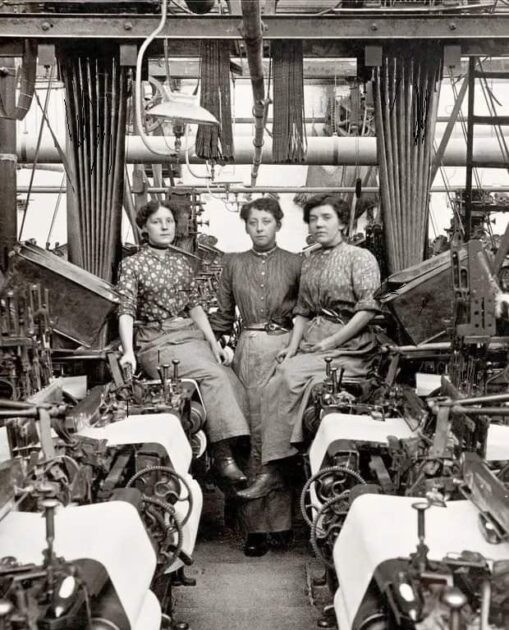
Lancashire’s Unsung Heroines: Women Factory Workers in the Cotton Mills circa 1908
In the early 20th century, the cotton mills of Lancashire were buzzing hives of industry, where the rhythmic hum of machinery filled the air and the scent of cotton hung heavy. Among the throngs of workers who toiled within these imposing structures, one group stood out for their resilience, determination, and often overlooked contributions – the women factory workers.
Circa 1908, Lancashire was at the heart of Britain’s textile industry, with cotton mills dotting the landscape and providing employment for thousands of workers. While men traditionally held positions of authority and oversight within these mills, it was the women who formed the backbone of the workforce, laboring tirelessly to keep the wheels of industry turning.
For these women, many of whom hailed from working-class backgrounds, employment in the cotton mills was not just a means of earning a living but a necessity for survival. With few opportunities available to them outside of the factory walls, they entered the workforce in search of economic independence and a better future for themselves and their families.
Life in the cotton mills was arduous and demanding, with long hours, grueling physical labor, and often hazardous working conditions. From the early hours of the morning until late into the night, women could be found operating looms, spinning yarn, and tending to the intricate machinery that powered the mills. Despite the challenges they faced, they approached their work with determination and fortitude, knowing that their efforts were essential to the success of the industry.
One of the most remarkable aspects of women’s work in the cotton mills was their adaptability and resilience in the face of adversity. Many women juggled their factory duties with the responsibilities of caring for their families, balancing long hours at work with domestic chores and childcare. Despite the immense pressures they faced, they remained steadfast in their commitment to providing for their loved ones and securing a better future for the next generation.
Yet, despite their invaluable contributions, women factory workers often found themselves marginalized and overlooked within the male-dominated world of industry. Their wages were typically lower than their male counterparts, and opportunities for advancement were limited. Nevertheless, they persisted, defying societal expectations and carving out a place for themselves within the fabric of Lancashire’s industrial landscape.
As we reflect on the lives of these unsung heroines of Lancashire’s cotton mills circa 1908, let us remember their resilience, their determination, and their enduring legacy. They may have been overshadowed by the machinery they operated and the products they produced, but their contributions were no less vital to the fabric of society. In their stories, we find inspiration and strength, a testament to the indomitable spirit of women throughout history.

Leave a Reply